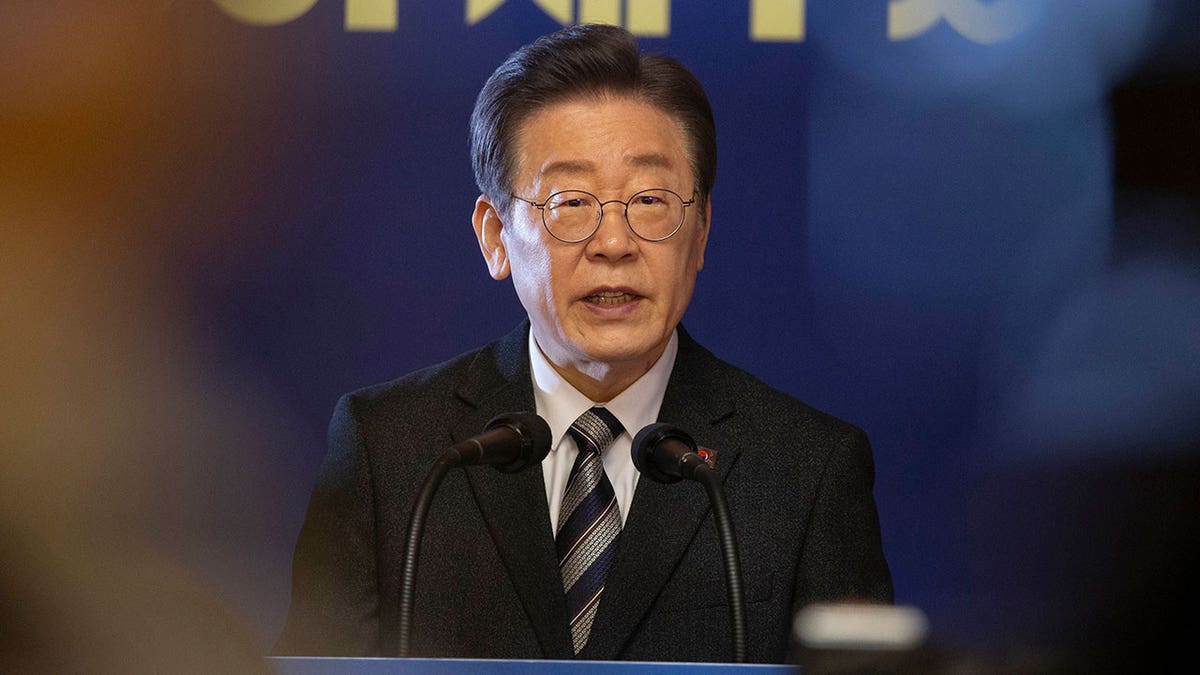More evidence reveals North Korea provided Russia with missiles
Fox News correspondent Stephanie Bennett joins 'Fox News Live' to break down recent evidence tying missile fragments in Russian attacks to North Korea.
- South Korean opposition leader Lee Jae-myung, who was recently stabbed in an attack, has accused President Yoon Suk Yeol of fueling societal divisions.
- Lee criticized Yoon for fostering polarization instead of promoting national unity and described his leadership as a "prosecutorial dictatorship."
- South Korean politics are deeply divided, with the upcoming elections viewed as a referendum on Yoon's leadership.
A South Korean opposition leader who was stabbed in an attack and underwent surgery earlier this month accused the country's conservative president on Wednesday of promoting divisive politics and worsening an already toxic discourse in the nation.
Lee Jae-myung also urged voters to support his liberal Democratic Party in the April parliamentary elections in order to keep what he described as President Yoon Suk Yeol’s "prosecutorial dictatorship" in check.
With Yoon, "our society has become even more extremely polarized," said Lee, speaking at his first news conference since the Jan. 2 attack. Instead of "leading the way in promoting national unity," Yoon is "obsessed with choosing sides and waging an outdated ideological war."
Lee was attacked during an event in the southeastern city of Busan. The attacker, a man police say they believe acted alone, approached him allegedly for an autograph and stabbed him in the neck, then left him bleeding and slumped on the floor.

Lee Jae-myung, leader of South Korea's main opposition Democratic Party, speaks during 2024 New Year's press conference at National Assembly in Seoul on Jan. 31, 2024. Jae-myung has accused the country's conservative president of promoting divisive politics and worsening an already toxic discourse in the nation.
Lee underwent surgery and spent eight days in hospital before his release. The suspect, who was arrested, later told investigators that he wanted to kill Lee to prevent him from becoming president.
At the news conference, Lee, who narrowly lost to Yoon in the 2022 presidential race, also claimed that his rival’s allegedly reckless policies were letting a decaying job market and tensions with nuclear-armed North Korea get out of hand.
Lee is seen as one of the early favorites for the 2027 presidential election but has struggled with a prolonged prosecutorial investigation over corruption allegations stemming from his days as mayor of the city of Seongnam, a job he held for a decade until 2018. He has denied legal wrongdoing and accused Yoon, a prosecutor-turned-president, of pursuing a political vendetta.
Lee in his remarks Wednesday described the attack against him as "an assassination attempt" in broad daylight, and an event previously "unthinkable in South Korea, reputed as the safest country in the world."
In another attack last week, Bae Hyunjin, a lawmaker from Yoon’s People Power Party, was treated for lacerations after being repeatedly struck in the head by a rock-wielding 14-year-old boy.
South Korean politics are deeply divided along ideological and generational lines, as well as regional loyalties, with political bickering intensifying ahead of the April vote. The elections are widely seen as a referendum on Yoon, who has already been struggling with low approval ratings and an opposition-controlled National Assembly that has limited the implementation of his agenda.
Since taking office, Yoon has turned from the dovish approach of his liberal predecessor, Moon Jae-in, who had pursued inter-Korean rapprochement, and instead moved to expand the South’s combined military exercises with the United States and Japan to cope with the North’s evolving threats.
Yoon has also sought stronger assurances from Washington that the U.S. would act swiftly and decisively to protect its ally in the event of a North Korean nuclear attack.
Also on Wednesday, Lee reiterated his standing criticism of Yoon’s hardened approach, saying it is contributing to the heightened North-South tensions. He called for renewed South Korean efforts to resume communication with the North — most urgently the revival of a disconnected military hotline between the two to prevent accidental cross-border clashes.
SOUTH KOREAN POLICE RAID HOUSE OF SUSPECT WHO STABBED OPPOSITION LEADER LEE JAE-MYUNG
Lee also berated North Korean leader Kim Jong Un for his recent declaration of abandoning the North’s longstanding objective of reconciliation with South Korea and defining the South constitutionally as the North's most hostile foreign enemy.
Kim’s threats are pushing the Koreas dangerously close to a possible military clash, Lee said adding that preventing an escalation was now the priority.
During a government meeting on Wednesday, Yoon warned of the possibility that North Korea could conduct various provocations ahead of the April elections in attempting to influence the outcome.
Experts say North Korea likely prefers that the opposition to maintain majority in the National Assembly in the South, thereby improving the opposition's prospects for the presidential election. The North's reasoning, they say, is that a liberal government in Seoul would be more willing to make concessions to Pyongyang.










































